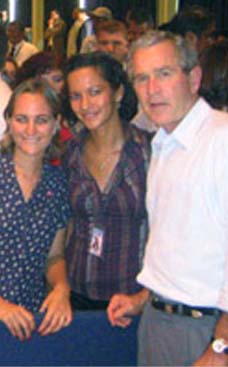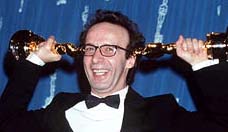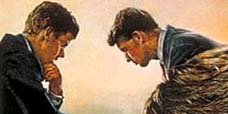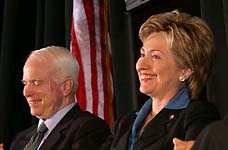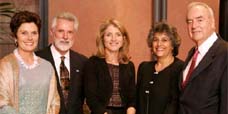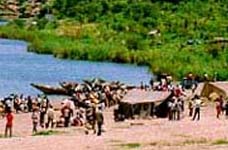
There had been a history of bad blood between McCarthy and the Kennedys. At the Los Angeles Democratic convention, which nominated John F. Kennedy as the party’s presidential standard-bearer in 1960, it had been McCarthy who led the last defiant stand in favour of Adlai Stevenson, the Democrats’ twice previously defeated candidate — delivering, in placing Stevenson’s name in nomination, what was undoubtedly the speech of the convention.
It was not in the Kennedys’ nature to overlook acts of lèse majesté of that kind, and throughout JFK’s presidency McCarthy found himself very much outside the White House loop. Relations with the murdered President’s political heir became even more strained when it became known that McCarthy was among the last two candidates being considered by Lyndon Johnson to be his 1964 running mate. The choice finally fell on McCarthy’s fellow-Minnesotan Hubert Humphrey but by then, since Bobby Kennedy had also coveted the position, the damage had been done.
The 1968 primary campaign was eventually to bring Gene McCarthy head-to-head with Robert Kennedy — but that was only after Kennedy had found himself forced by the success of the McCarthy campaign in New Hampshire (where what was described at the time as his “children’s crusade” secured not merely 42 per cent of the vote but 20 of the state’s 24 convention delegates) to reconsider his whole strategy of sitting the election out.
Gene McCarthy dies
Eugene McCarthy
March 29, 1916 - December 10, 2005
Caption: Presidential candidate Sen. Eugene McCarthy, D-Minn., is surrounded by college student supporters after making a speech in Racine, Wis., in this March 20, 1968, file photo. McCarthy, whose insurgent campaign toppled a sitting president in 1968 and forced the Democratic Party to take seriously his message against the Vietnam War, died Saturday, Dec. 10, 2005. He was 89. (AP Photo, file)
Senator who stole the march on Robert Kennedy by declaring his opposition to US policies in Vietnam
GENE McCARTHY was once said by J. K. Galbraith to have done more than any other American to put an end to United States involvement in Vietnam. Characteristically, he dismissed the tribute out of hand. A proud man, his stock-in-trade was nevertheless self-depreciation — it was typical of him on one occasion to describe a rapturous reception he had just been given for one of his 1968 campaign speeches as “a crouching ovation”. If he had ambitions, they lay far more in trying to be a poet — he published his last volume of poems only in 1997 — than in enjoying the adulation that for a brief, shining hour made him the American liberal hero.
In fact, he was hardly a liberal at all — if anything he was (like the Vietnam War’s other great early opponent, the columnist Walter Lippmann) a figure of naturally conservative disposition. It was partly this which made his decision, taken in November 1967, to challenge President Lyndon Johnson on his Vietnam escalation policy so unexpected. The eyes of Washington were almost exclusively on Robert Kennedy but — as he procrastinated and temporised over the war — the 51-year-old senior senator from Minnesota calmly stepped in and stole the traditional Kennedy constituency of the young and the idealistic from under Bobby Kennedy’s nose.
There had been a history of bad blood between McCarthy and the Kennedys. At the Los Angeles Democratic convention, which nominated John F. Kennedy as the party’s presidential standard-bearer in 1960, it had been McCarthy who led the last defiant stand in favour of Adlai Stevenson, the Democrats’ twice previously defeated candidate — delivering, in placing Stevenson’s name in nomination, what was undoubtedly the speech of the convention.
It was not in the Kennedys’ nature to overlook acts of lèse majesté of that kind, and throughout JFK’s presidency McCarthy found himself very much outside the White House loop. Relations with the murdered President’s political heir became even more strained when it became known that McCarthy was among the last two candidates being considered by Lyndon Johnson to be his 1964 running mate. The choice finally fell on McCarthy’s fellow-Minnesotan Hubert Humphrey but by then, since Bobby Kennedy had also coveted the position, the damage had been done.
The 1968 primary campaign was eventually to bring Gene McCarthy head-to-head with Robert Kennedy — but that was only after Kennedy had found himself forced by the success of the McCarthy campaign in New Hampshire (where what was described at the time as his “children’s crusade” secured not merely 42 per cent of the vote but 20 of the state’s 24 convention delegates) to reconsider his whole strategy of sitting the election out.
On March 16, 1968, just four days after the New Hampshire primary, the elder of the two surviving Kennedy brothers announced his entry into the presidential race — and a fortnight after that Lyndon Johnson, in declaring a suspension of the bombing over most of North Vietnam and an intention to get peace talks started, also made known his refusal to accept renomination in any circumstances. For two heady months the battle for the Democratic nomination looked as if it lay between two Irish American senators — a cool, reflective one from Minnesota and a passionate, headstrong one from New York — with Hubert Humphrey, having launched his own campaign too late to enter any primary, hovering very much on the sidelines.
It was, of course, an unequal battle. For all their pure idealistic enthusiasm, the McCarthy forces could never match the sheer professionalism of the Kennedy campaign staff and, having won Wisconsin (where Bobby Kennedy was too late to get on the ballot), McCarthy went down to successive bad defeats in Indiana and Nebraska. But, after that, a miracle suddenly seemed about to happen. In the Far West state of Oregon all the prophets and political wiseacres were confounded when McCarthy beat Kennedy by 44 per cent of the vote to 39. It was the first defeat that the Kennedys had suffered in any election since John F. Kennedy had failed to win the floor fight for the 1956 vice-presidential nomination at Chicago in 1956.
Only a week ahead lay the crucial contest in California and, with the momentum now behind him, it looked initially as if McCarthy might win that, too. But a poor performance in a televised debate — in which Kennedy shamelessly played the race card — was enough to dash the hopes of what had remained his predominantly youthful followers. Kennedy won by a decisive though not a crushing margin — and that same night was shot in a kitchen of the Los Angeles Hilton. His death two days later marked, in effect, the end not just of that summer’s primary campaign but of McCarthy’s political career as well.
By the time he got to Chicago in August 1968 for that year’s Democratic convention, it was only as the leader of a distinctly dispirited and bedraggled army, whose morale was hardly restored by the brutal treatment meted out to them by Mayor Richard Daley’s police in Lincoln Park. Some incautious remarks McCarthy made on the eve of the convention, seeming to minimise the significance of that August’s Soviet invasion of Czechoslovakia, appeared merely to underline his lack of seriousness as a political figure (by now he was spending far more time with his great friend, the poet Robert Lowell, than he was with his speechwriters or campaign aides).
In the Chicago Stockyards Hubert Humphrey was nominated, if hardly without storm and stress, as the party’s presidential candidate — and McCarthy retreated to a slightly sulky tent, from which he emerged some eight weeks later to give a distinctly half-hearted and unmistakably lukewarm endorsement to his old friend and colleague Humphrey in his ultimately losing presidential battle against Richard Nixon. McCarthy at least possessed sufficient steel in his character to refuse the flattering offer that Nixon almost immediately made to him of becoming the US Ambassador, with Cabinet rank, at the United Nations.
The truth was that Eugene Joseph McCarthy was always a most unusual politician. The son of a Roman Catholic cattle-dealer in the predominantly Protestant state of Minnesota, he had a conventional Catholic education culminating in a novitiate at the local Benedictine monastery of St John’s.
There seems no doubt that for a time McCarthy did seriously intend to become a monk; he certainly felt sufficiently strongly about his vocation to break off his engagement to a local Catholic schoolteacher, Abigail Quigley, who did eventually become his wife. Whether voluntarily or not, he left the Benedictine novitiate after nine months — first for training at a Milwaukee seminary with a view to becoming a secular priest, and then for a college career teaching economics.
This occupation led him naturally into politics, where he started off as a volunteer in the newly formed Democratic-Farmer-Labor Party of Minnesota. The new party, allied to the national Democrats, had just scored its first success by electing Hubert Humphrey Mayor of Minneapolis in 1945 and the local political atmosphere was full of energy and excitement. Campaigning in a beaten-up old Chevrolet, McCarthy tapped straight into this postwar mood in his effort to become only the second Democratic congressman from the state’s fourth distrtict in 50 years.
He proved a born campaigner, eventually coasting home by the comfortable margin of 25,000 votes and holding the district easily through the next four elections.
Perhaps the first sign that there was from the beginning something of a gambler’s streak in McCarthy’s character came with his decision in 1958 to stake everything on making a run for the Senate. This involved taking on not only powerful rivals within his own party but also challenging a two-term Republican incumbent. But what McCarthy brought to the contest was a cavalier, devil-may-care attitude that the voters obviously found attractive. At the end of a tough campaign he won by a plurality of more than 100,000 votes.
He may not have been universally popular in Washington but he consistently had his devotees, not least in the press corps. Yet even his admirers became increasingly saddened as — even when in the many years he served as a director of the former New York publishing house of Harcourt Brace Jovanovich — he proved quite unable to get the presidential bug out of his system, running both in 1976 and 1992 as an Independent for the presidency rather in the manner of his fellow Minnesotan, the “boy wonder” Harold Stassen, long before him.
He latterly also took to litigation, attempting to bring a succession of constitutional cases before the Supreme Court over what he considered to be the overriding of minorities on such matters as political funding and broadcast election debates, topics he was to raise in his last book, No-Fault Politics: Modern Presidents, the Press and Reformers (1998).
McCarthy’s marriage to Abigail Quigley foundered almost immediately after his 1968 presidential campaign, and in the latter part of his life he found companionship with the former CBS television reporter Maria McLaughlin.
She predeceased him, in 1998, as did his wife Abigail in 2001. The two were never divorced.
He is survived by the son and two daughters of his marriage.
Eugene McCarthy, US senator, was born on March 29, 1916. He died on December 10, 2005, aged 89.








